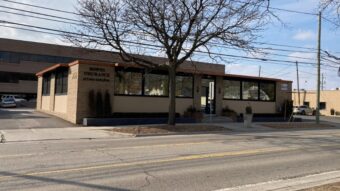The number-one shining light in the Midwest. That’s how Jason Krug, managing director with Berkadia, described Columbus during the Columbus Commercial Real Estate Virtual Summit held remotely Aug. 14.
That type of optimism wasn’t unusual during the event. Yes, speakers at the summit – the sixth that Midwest Real Estate News and REjournals has held in Columbus – were realistic. The COVID-19 pandemic has impacted the commercial real estate industry, with many sectors – hospitality, retail and entertainment – suffering greatly.
But panelists at the event also expressed hope. This pandemic won’t last forever, they said. Life will return to normalcy eventually. And when it does? The Columbus real estate market will emerge even stronger.
As panelists said, heading into 2020, commercial real estate in Ohio’s capital city was soaring, with the industrial and multifamily markets especially enjoying years of falling vacancies, rising rents and soaring demand. It’s this strength that panelists pointed to when explaining why they think the future still looks bright for commercial real estate in Columbus.
Brian Schottenstein, president of Schottenstein Real Estate Group, is a good example. He said that his company, a developer of apartment and mixed-use properties, never stopped closing deals even during the worst days of the COVID-19 pandemic.
“Things have changed, it’s true. But we have continued to build,” Schottenstein said. “Construction is considered an essential business, so we didn’t have to shut down. We’ve been working straight through this.”
Schottenstein said that about 99 percent of the residents of his company’s properties are paying their monthly apartment rent on time.
“People realize how important it is to have a comfortable safe place to live,” Schottenstein said. “The multifamily sector is one of the best sectors in real estate to be in right now. You don’t necessarily have to work in an office or shop in a store. You can work from online and shop online. But you do need a place to live.”
Jane Arthur Roslovic, managing partner with Treplus Communities, a multifamily developer that focuses on communities for active adults 55 and older, said that her company’s business has been solid during the pandemic, too.
One reason? Treplus has been an influx of residents moving in from independent-living facilities. Residents are leaving these communities because most of them still remain locked down as a response to the pandemic. Residents, tired of not being able to see their family members in person because of these lockdowns, are moving out of these facilities and into communities such as those offered by Treplus.
Treplus also attracts clients who want to downsize but aren’t ready to move into independent- or assisted-living facilities, Roslovic said.
“From an operational standpoint, it has been fantastic how our entire property management staff has pivoted and raised up to deal with this situation,” Roslovic said. “We are focusing on virtual tours of our properties and on self-guided tours. We are showing our properties in every way we can. We are still getting good traffic. People are still moving. I won’t say we’ve been getting normal traffic. It did drop off. But we are still seeing traffic.”
This isn’t to say there haven’t been challenges. Treplus had to shut down its communities’ common areas, business centers and fitness centers. Roslovic said that these areas represent the heart of Treplus’ communities, the places where its residents congregate.
Today, though, Treplus has partially reopened these areas. Some of the common areas, such as business centers and fitness centers, do require reservations. And residents must wear masks in these areas.
“But we are getting back to some level of normal,” Roslovic said.
Nathan Murphy, senior advisor with Capstone Apartment Partners, said that he is thankful to work in a market like Columbus. This Midwest city is stable, he said. And that stability has become a bonus during a time of upheaval and uncertainty.
“This might not be the sexiest of markets, but it is a strong one,” Murphy said. “When things are going well, people want those really high highs. We don’t get those. But when things are tough? In the Midwest, our lows aren’t as low.”
Murphy said that he hasn’t seen a major slowdown in activity in the multifamily market. It’s true that some institutional investors are quiet, he said, and will remain quiet for a while. But private equity remains active, and Columbus is attracting plenty of this kind of investment, Murphy said.
“Overall, there is so much activity here,” Murphy said. “Closing deals and finding buyers is not a problem. The only problem might be that there are too many buyers. It’s not hard to find buyers. It’s hard to find sellers.”
Murphy said that his office hasn’t had a deal die because of COVID. Closing the deal might take longer, he said. But the deals are still closing.
“That indicates how strong Columbus is overall,” Murphy said. “We have a lot of out-of-town money coming in.”
Krug said that many in the multifamily industry did take a short pause when the pandemic first hit. Today, though, activity has resumed in Columbus’ apartment sector, Krug said.
And brokers, developers and investors? Krug said that they have regained their confidence in Columbus after that brief pause.
“The great thing about the team we’ve assembled is that a lot of the people on it have lived through a lot of cycles,” Krug said. “Is this one different from anything that we’ve experienced before? I don’t know. We tend to say that about most of the cycles we see. I’ve found, though, that leaning back on the experience we have can help.”
Institutional investors at the start of the pandemic were looking for a blanket 10 percent COVID discount on multifamily properties, Krug said. But that discount hasn’t happened thanks to the strength of the multifamily sector.
“This is an asset class that is poised to do well,” Krug said. “There is a massive demand for it. This pandemic has only made that clearer.”
Industrial is another market that has remained strong during the pandemic. Brian Marsh, managing director with JLL, said that much of the credit for this goes to the consumers who have flocked to online shopping during the pandemic.
The strength of e-commerce has forced companies to boost the number of distribution centers and warehouses they operate across the country. This has benefitted the Midwest. With its central location, the Midwest — including the Columbus market — has become a key region for companies hoping to get their products to more customers in fewer days.
“The industrial side of the market is very stable right now,” Marsh said. “You could potentially see prices increasing because of rising demand, even during the pandemic.”
And once life and business return to some sense of normalcy? Marsh said that he expects industrial to soar even more thanks mostly to e-commerce and the need for more last-mile distribution facilities.
“We are seeing this all over the country. If you are delivering to the customer, you have to be closer to the customer,” Marsh said. “If you want to do same-day or one-hour delivery, you need a facility near a population center. This is a national trend, one that we are also seeing in Columbus.”
Azra Nakicevic, director of tax and business advisory services for GBQ Holdings, said that even though Columbus’ CRE market is relatively healthy today, it is seeing some challenges because of the pandemic.
Big projects? Many of those have fallen through since mid-March, Nakicevic said.
“Investors are pretty wary now,” she said. “They are having a harder time getting to that capital stack they need. In the last two months, we’ve mostly seen smaller projects move through pipelines. Many of them are just redevelopments of existing properties that are already there. We haven’t seen too many brand-new projects that have started since May.”
An interesting twist on the pandemic is that even though hospitals and doctors are busy, the healthcare sector itself wasn’t immune to the slowdown brought by COVID-19. Steven Wathen, chief executive officer of Equity, LLC, said that the healthcare sector suffered an immediate hit because of the pandemic.
That’s because most healthcare providers put a hold on non-emergency medical services to help handle the rush of COVID cases. Shutting off those services resulted in a financial hit for many medical providers, Wathen said.
Since then, healthcare providers have again started scheduling non-emergency procedures, and this provided a boost to these providers’ bottom line, Wathen said.
“A lot of people thought this pandemic would provide an immediate boost to the healthcare sector,” Wathen said. “But elective surgeries shut down. When that happened, the profits to healthcare providers went down very fast. When medical offices started to reopen in May, the business of healthcare started to recover quickly. But everyone has had a lot of rent that didn’t get paid, starting as soon as this hit in March.”
Wathen said that in April, Equity collected about 74 percent of the rent it was owed in its healthcare portfolio. In June, that number had risen to 87 percent.
Zach Turner, a brokerage assistant with the Patton-Wiles-Fuller Group of Marcus & Millichap, specializes in retail sales in Columbus and the entire Midwest. Retail, of course, has suffered a bit hit during the pandemic.
As Turner said, mandatory business shutdowns disproportionately impacted the retail sector, with many retailers having to shut their doors. Unemployment in the retail sector skyrocketed during the early weeks of the pandemic.
“Shutting down meant virtually no business for non-essential brick-and-mortar businesses,” Turner said. “That put a real strain on tenants and landlords, even those with e-commerce channels. Our job was to help them figure out the next steps to survive. Not every tenant had the financial runway to survive an event like this.”
Most retailers are still not back to 100 percent when it comes to capacity, foot traffic and sales, Turner said. The sector, then, is still suffering the consequences of the shutdowns. Turner said that retailers are getting creative to make it through the pandemic, but not all of them will survive.
Wayne Harer, executive managing director with Newmark Knight Frank, said that COVID-19 also struck the office market. This sector was hot in Columbus coming into 2020, he said. But that hot streak came to a quick stop.
“About March 12, all of a sudden everyone stopped,” Harer said.
Today, office space is hitting the market in Columbus at a rapid pace, Harer said. He said that as of the date of the summit, 15 buildings or spaces had put up more than 10,000 square feet of office space for sublease.
“The question is, who will take those spaces?” Harer asked.
Harer said he is optimistic that once the United States has a COVID-19 vaccine ready, people will return to the office.
“Before this hit, the unemployment rate here was low,” Harer said. “People were knocking down space consistently. COVID shut the faucet off. Now everyone suddenly wants to put space back on the market. I am very optimistic, though, that 2021 will be far better than 2020.”




